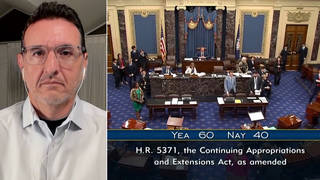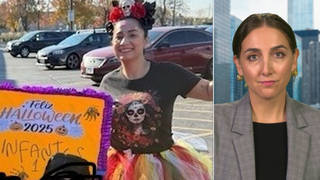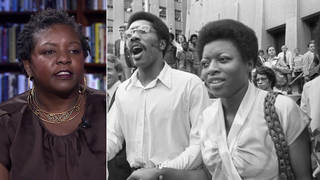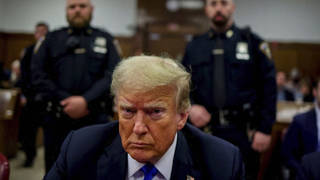
Guests
- Nicky Woolfreporter for The Guardian who has been covering the Republican primary elections and caucuses.
In his third consecutive victory, billionaire businessman Donald Trump has easily won the Nevada caucus. Trump received 46 percent of the vote, winning most key demographic groups. Florida Senator Marco Rubio placed second with 24 percent. Texas Senator Ted Cruz came in third with 21 percent. “We won the evangelicals. We won with young. We won with old. We won with highly educated. We won with poorly educated—I love the poorly educated—with the smartest people, with the most loyal people,” Trump said. “And you know what I really am happy about? Because I’ve been saying it for a long time—46 percent with the Hispanics, 46 percent, number one with Hispanics. I’m really happy about that.” We speak to Nicky Woolf, a reporter for The Guardian who covered the Republican caucus.
Transcript
AMY GOODMAN: We move on right now to, well, the 2016 elections. Juan?
JUAN GONZÁLEZ: Well, in a third consecutive victory, billionaire businessman Donald Trump easily won the Nevada caucus last night, capturing 46 percent of the vote. Florida Senator Marco Rubio placed second with 24 percent. Texas Senator Ted Cruz came in third with 21 percent. Record turnouts were reported across the state, causing long lines and, at times, chaotic scenes at the caucus sites. After four contests, Donald Trump has become the clear front-runner for the Republican nomination, having secured 79 delegates while Cruz has 16 and Rubio has 15. Now the focus turns to Super Tuesday on March 1st, when 13 states across the country will vote in nine primaries and four caucuses. In a victory speech, Trump thanked his supporters in Nevada.
DONALD TRUMP: So, we won the evangelicals. We won with young. We won with old. We won with highly educated. We won with poorly educated—I love the poorly educated—with the smartest people, with the most loyal people. And you know what I really am happy about? Because I’ve been saying it for a long time—46 percent with the Hispanics, 46 percent, number one with Hispanics. I’m really happy about that. So—
TRUMP SUPPORTERS: Trump! Trump! Trump! Trump! Trump! Trump! Trump!
AMY GOODMAN: We go now to Reno, Nevada, where we’re joined by Nicky Woolf, a reporter for The Guardian who covered the Republican and the Democratic caucus.
We welcome you to Democracy Now! Talk about what happened last night. Trump particularly called out his Latino support. When you do the math, though the tremendous number of people came out for the Republicans—right?—in terms of their record number of people who came out, the numbers of Hispanics—he said that he got something like 46 percent of the vote—it came to under 3,000—is that right?—voters, because Hispanics make up something like 8 percent of the Republicans in Nevada who vote?
NICKY WOOLF: Yeah. Good morning, and thank you for having me. So, my understanding of that statistic is that it comes from an NBC exit poll of 139 total Hispanics. So it’s actually—it’s got a margin of error of 10 points on that. So it’s—he still, even within the margin of error, still won a majority of Hispanics in the state, which is, however way you slice it, pretty incredible, considering that his two major rivals are both Hispanic. But it’s worth taking that stat with a pinch of salt, I think.
JUAN GONZÁLEZ: And, Nick Woolf, what about the situation in the caucuses? There were record turnouts, but these are still, obviously, caucuses. They’re not actual primaries, so people have to have a higher level of participation than normally would in a selection process.
NICKY WOOLF: Yeah, exactly. And the difference between this one and the Democratic caucuses on Saturday, previous Saturday, is that the Democratic caucuses—they both have the meetings in the local precincts, and then the Democrat caucuses have an open, visible vote, so people essentially stand in corners on behalf of the candidate they choose. For the Republican one, it was a secret ballot, which—during the Democrat one, a lot of people said that the open nature of the vote made it slightly less democratic. So that’s one interesting difference. But certainly, despite that, the Republican ones were very chaotic—huge lines at polling stations. People weren’t ready for the enormous turnout. And there was a lot of kind of slightly shady stuff going on—a lot of precinct volunteers, the people who were counting the votes, wearing Donald Trump paraphernalia. Now, the party, the state GOP—
AMY GOODMAN: Wait, wait, wait. Can you explain that? What do you—
NICKY WOOLF: —tweeted that this wasn’t technically against the rules, but—
AMY GOODMAN: Nicky, can you explain what you mean when you said people counting the vote who were wearing Donald Trump paraphernalia?
NICKY WOOLF: So, at each precinct, there are some volunteers, the people who give out the ballots, the people who take in the ballots and count them. They’re supposed to be nonpartisan. They’re supposed to not show a preference for one candidate or the other. But there was a lot of people, in sort of dozens of precincts, who were tweeting pictures of them wearing the sort of famous “Make America Great Again” hats or sort of Trump T-shirts, and sort of showing a visible preference. And a lot of people, from especially the Rubio campaign, were complaining that this was against the rules. It turned out it’s not technically against the rules. Obviously, caucuses are governed by party bylaw rather than any kind of federal laws. But certainly, it sort of—it wasn’t a great look.
And there were sort of lots of people who were counted twice, lots of times when ballots were sort of slipping to the floor. The way that the results get sent in—and this is, I found, completely unbelievable—they count the ballots at each precinct, write down the numbers on the back of an envelope, take a picture of the back of that envelope and then email that picture in to the GOP, which seems like an immensely cumbersome way of doing it and risks all kinds of issues—maybe some emails got lost. Again, Donald Trump won the state with such an enormous margin that I’m not sure any of that really matters that much. But it sort of—it made for a bit of a crazy evening.
AMY GOODMAN: The entrance polling from ABC News shows 61 percent of caucusgoers want the next president to be from outside the political establishment. Donald Trump took those voters by 70 percent. Six in 10 also described themselves as angry [at] the way the federal government is working, and Trump won half of those angry voters in Nevada. Also, can you talk about the pronunciation of the word? I think a lot of people are surprised. I mean, do you say “Nevahda,” or do you say “Nevada”?
NICKY WOOLF: So, I’ve been corrected on this a lot since getting into the state. I think it’s my accent. I say “Nevahda.” It is technically “Nevada.” That’s the way it’s supposed to be. I keep slipping and saying it the wrong way.
AMY GOODMAN: And, Juan, you had some thoughts on this.
JUAN GONZÁLEZ: Yeah, well, since “Nevada” actually means a “snowfall” in Spanish, and that’s the name of the state—
NICKY WOOLF: Ah, I see.
JUAN GONZÁLEZ: —that it should be “Nevahda.” But I guess the Anglos who settled Nevada decided to change the pronunciation. But, Nick, I’d like to ask you about—as we head into now Super Tuesday, and obviously while Trump is a front-runner, the states that he has been winning in, with the exception of South Carolina, are small states. Now we’re going to get into some really big states. Ted Cruz obviously is expecting to rack up a whole bunch of delegates in his home state of Texas, and I think Marco Rubio is expecting the same in Florida, so that Super Tuesday could shift some of this, even though it’s clear that Trump has won the—has fired the imagination of many of the disenchanted members of the Republican Party.
NICKY WOOLF: I think there’s a chance of that. I think there’s also a lot of wish fulfillment in the Republican establishment that’s hoping against hope that something—that the Trump phenomenon is a small state phenomenon. I actually don’t think that’s the case. First of all, he’s ahead in the polls in almost all of these states. But also, if we think about what Trump really means, it’s the obsolescence of the kind of big money advertising politics and the—in a lot of ways, the obsolescence of TV advertising by social media, because Trump has barely had to spend any money in any of these states on any advertising. And that’s because he’s got such an enormous following on Twitter, on social media, and because everything he says gets—is so inflammatory that it gets reported by the media pretty much for free, that he just doesn’t need to be spending the kind of money that usually stops insurgent candidates in the larger states. And I think that’s what—that’s what really tripped up the Jeb campaign, who found that however much money they threw at advertising, it just wasn’t making a dent. And also, there’s—you know, there’s a hunger for something different in the Republican Party and in the Republican primaries, and I don’t think that’s just necessarily a small, retail-politics state phenomenon.
AMY GOODMAN: You also covered the Democrats—Bernie Sanders and Hillary Clinton.
NICKY WOOLF: Yeah.
AMY GOODMAN: And explain what happened there with Hillary Clinton winning.
NICKY WOOLF: So, I mean, it was extremely close. The margin—the thing I found interesting was that the margin on Saturday in the Democrat caucuses was almost exactly the same as it was in 2008 between Hillary Clinton and Barack Obama. Now, after that, Obama went into South Carolina and won a large percentage of the black vote there. And the question is: Can Bernie Sanders pull off the same thing? That remains to be seen.
In a lot of ways now, the Democratic primary is looking a lot more like an ordinary primary would be expected to at this point. I think, in that particular case, Bernie Sanders does not have the kind of Donald Trump level of TV coverage which will allow him to kind of power through in South Carolina and beyond. Maybe I’m wrong about that; that sort of remains to be seen. But that was the establishment of the Democratic Party reasserting itself, in some ways, although not by as much as a comfortable margin as I think Hillary Clinton would have liked.
JUAN GONZÁLEZ: And, Nicky, I’d like to go back to this whole issue of what’s driving the Trump phenomenon, because you mentioned that this is basically the Republican voters rejecting the big money advertising campaigns, but we’ve had, in American history, numerous examples of similar-type candidacies. A lot of us remember Jesse Ventura, who became—who won a governorship as a supposed independent, riding the wave of angry voters. A lot of us remember Arnold Schwarzenegger. And these folks had become major celebrity figures before they ran for office, and then actually rode that wave of their being celebrities to actually then capture office, and neither of which—neither Ventura nor Schwarzenegger will go down as memorable political leaders of their states. So, it it—how much is the Trump celebrity affecting his ability to garner support?
NICKY WOOLF: I think Trump—there’s definitely comparisons to be made with those two, and—in terms of the practice you get in creating a media persona for yourself by having been a celebrity first. You could also argue that even Ronald Reagan might have been an example of that. But I think Trump is also a uniquely 21st century social media phenomenon, too. He’s huge, to paraphrase him, on Twitter. He’s got this enormous following. He can reach more people with a tweet than almost every TV ad market in the country. Now, that’s something that Schwarzenegger never had and that Jesse Ventura never had, that Reagan never had. I think that changes the arithmetic of stuff a bit here. And he’s just so able to build this brand. It’s difficult to not see him as a pretty unique phenomenon now. And it’s amazing to watch. I mean, it’s just absolutely spectacular how he’s playing with the Republican Party like a cat with a mouse. It’s fantastic.
AMY GOODMAN: Nicky Woolf, we’re going to leave it there. I want to thank you for being with us, joining us from Reno, Nevada, The Guardian, has been covering the Republican primary and caucuses, and Democrats, as well, for the paper.
This is Democracy Now! When we come back, we remember a young Black Lives Matter activist. Stay with us.











Media Options